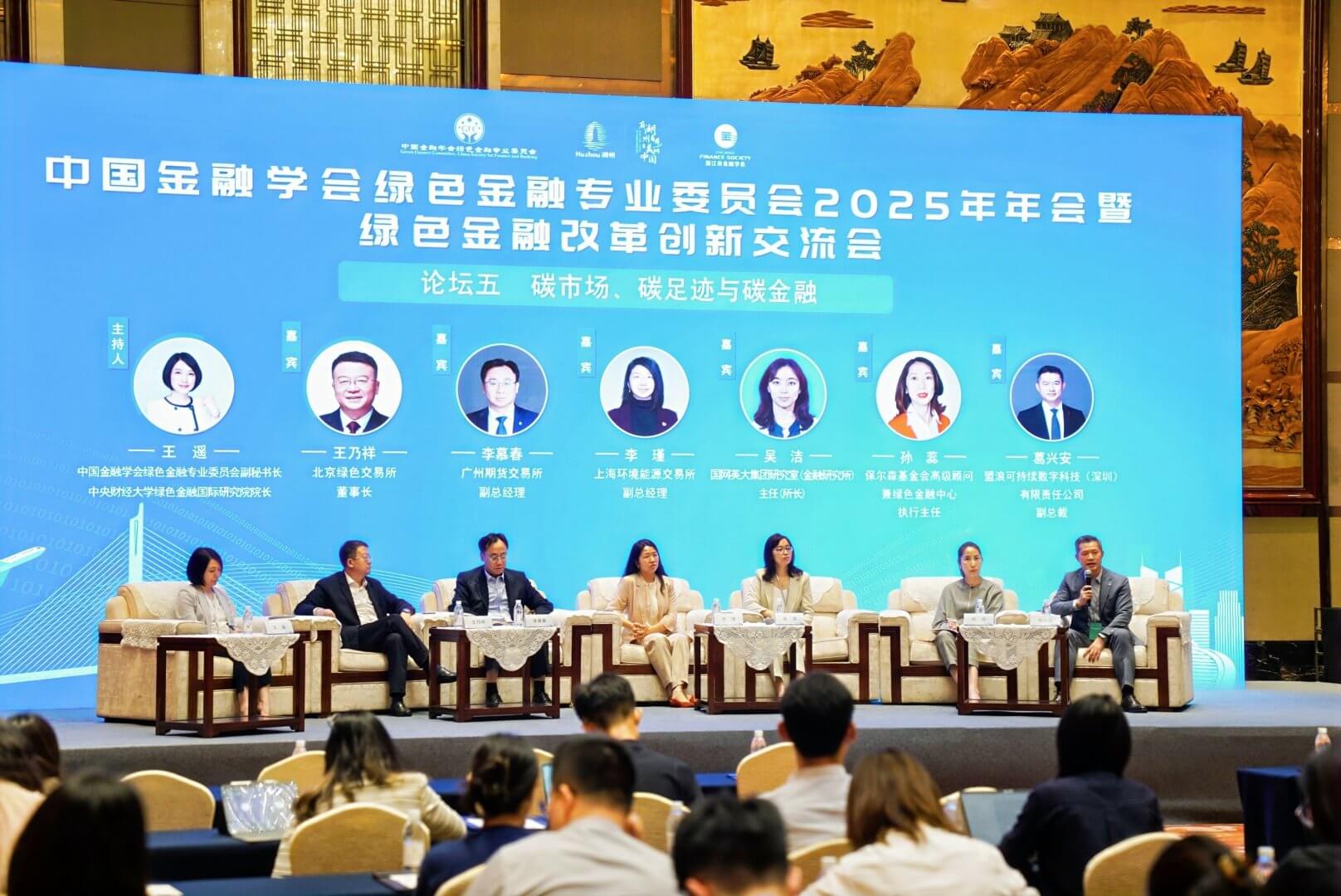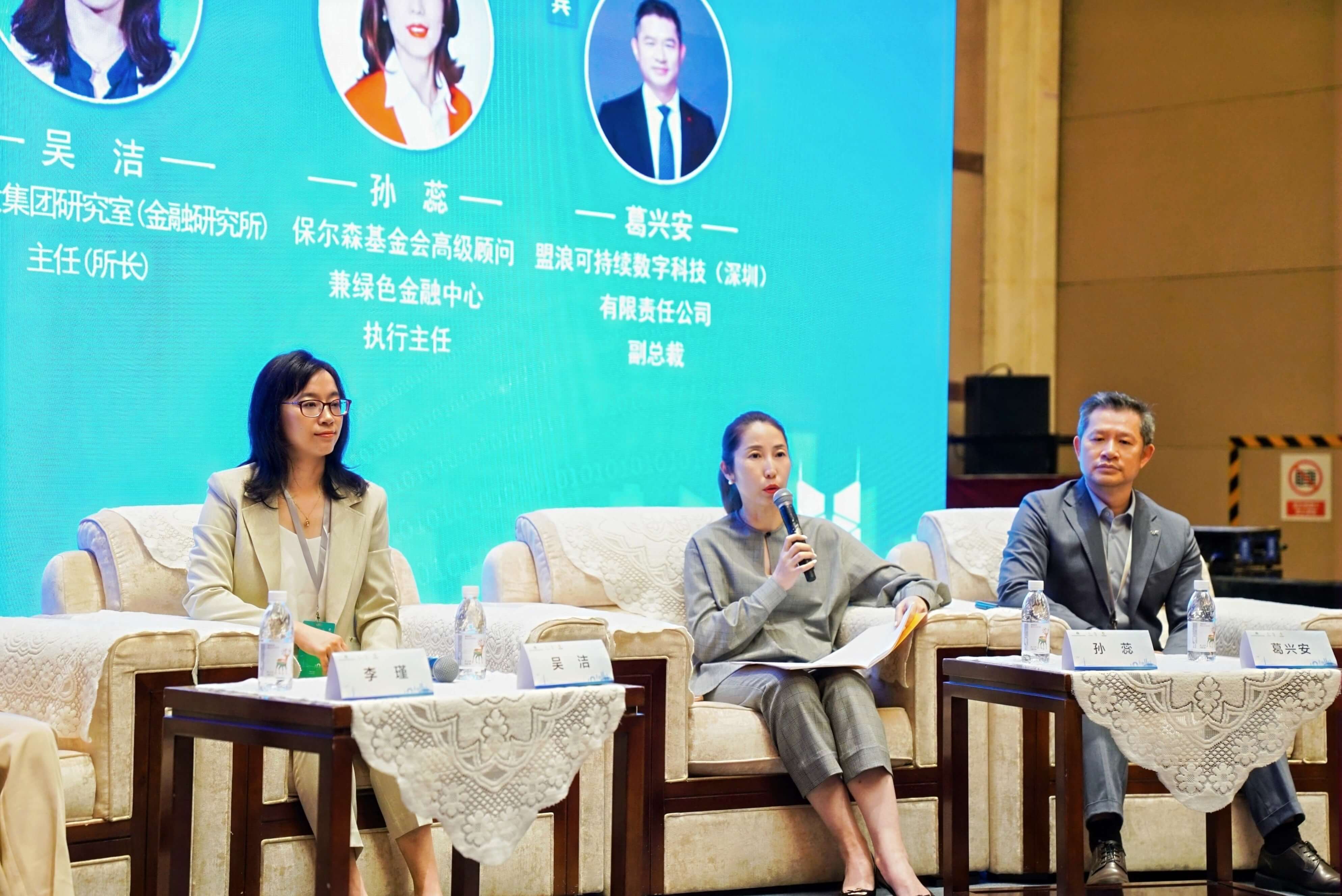Recently, the annual meeting of the Green Finance Committee (GFC) of the China Society for Finance and Banking was held in Huzhou, Zhejiang. This year marks the 20th anniversary of the Two Mountains concept (Lucid Waters and Lush Mountains Are Invaluable Assets) and the 10th anniversary of the official establishment of the GFC. Dr. Ma Jun, Chairman of the Green Finance Committee, presided over the meeting.
Leaders from the People’s Bank of China, major financial institutions, and more than a hundred experts attended and delivered remarks. Key topics included:
- Green finance innovation
- International cooperation
- Financial support for biodiversity
- Sustainability-related information disclosure
- Carbon market development
- Climate adaptation strategies
- Financial institution transition
- Green inclusive finance

Gracie Sun, Senior Advisor, Paulson Institute and Managing Director, Green Finance Center, was invited to participate as a panelist in the sub-forum titled Carbon Market, Carbon Footprint, and Carbon Finance.
The session was moderated by Ms. Wang Yao, Dean of the International Institute of Green Finance at the Central University of Finance and Economics, and featured panelists including Wang Naixiang, Chairman of the Beijing Green Exchange; Li Muchun, Deputy General Manager of the Guangzhou Futures Exchange; Li Jin, Deputy General Manager of the Shanghai Environment and Energy Exchange; Wu Jie, Director of the Research Office at State Grid Yingda Group; and Ge Xing’an, Executive Vice President of Susallwave Technology.
Gracie shared the Paulson Institute’s key initiatives in promoting global carbon market interoperability, including its support for the G20 Sustainable Finance Working Group in advancing the interconnectivity of global voluntary carbon market infrastructure and the development of common data models, as well as in promoting mutual recognition of international carbon credit standards.
She also highlighted PI’s practices and key achievements in supporting the development of China’s carbon market and advancing international cooperation over the past few years.
Since 2017, the Paulson Institute has continuously and consistently provided policy advice and recommendations on China’s carbon market governance, monitoring, reporting, and verification (MRV) systems, as well as international engagement, while also exploring the application of fintech in the carbon market.
In 2024, the Paulson Institute, in collaboration with the International Finance Forum (IFF) and several other international financial institutions and enterprises, organized a seminar on bamboo forest carbon sinks in Huzhou Anji and the use of innovative financial instruments.
Earlier this year, PI convened domestic and international carbon market experts, including representatives from the World Bank and Verra, to discuss pathways for global carbon credit market cooperation. The resulting research outcomes were submitted to support the G20 Sustainable Finance Working Group’s agenda.

During the opening remarks session of the annual meeting, Wang Xin, Director-General of the Research Bureau of the People’s Bank of China (PBoC), delivered the keynote speech on behalf of Deputy Governor Lu Lei. Lu emphasized that in recent years, the PBoC, in collaboration with relevant departments, has made significant progress in strengthening China’s green finance system—particularly in areas such as top-level policy design, regulatory frameworks, sustainability-related information disclosure, product development, and international cooperation.
Looking ahead, the PBoC will focus its efforts on four key priorities:
- Connecting green finance with transition finance
- Promoting financial support for nature and biodiversity
- Deepening international cooperation
- Supporting regional green finance reform initiatives, including the capacity-building base in Huzhou, Zhejiang.
At the meeting, Dr. Ma Jun presented a report titled GFC 2025 Work Report and 2026 Outlook. He reviewed the progress made by the GFC’s six working groups in areas such as environmental disclosure, green finance innovation, international experience sharing, biodiversity finance, inclusive green development, and gender-focused sustainable finance. More than 200 institutions have participated in these efforts, yielding several actionable outcomes.
Looking ahead, the GFC will continue to support the development and implementation of transition finance taxonomies, promote corporate carbon accounting and sustainability-related information disclosure, assist financial institutions in formulating transition plans, and foster innovation in green financial products and services. It will also encourage research on climate adaptation finance and climate-related insurance, work to expand the carbon finance market and enhance its interoperability, and improve the alignment of international taxonomies, such as the Common Ground Taxonomy. In addition, the GFC will continue to advance research and standard-setting in biodiversity finance and seek to expand the impact of the Capacity-building Alliance of Sustainable Investment (CASI).
The Paulson Institute remains committed to building a robust green finance ecosystem and advancing market-based solutions to support the growth of global green finance.



